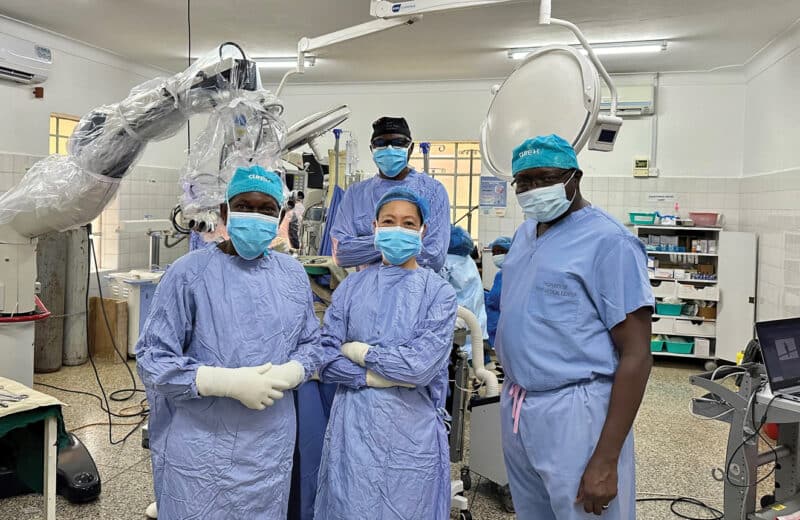About two years ago, Michael Saraceno decided he wanted to lose weight. He was nearing 275 pounds and was planning to have knee surgery. To trim down before surgery, Saraceno decided to focus less on what he ate and to change when he ate instead.
Saraceno, 26, of Westchester, has since lost about 80 pounds, most of which he credits to intermittent fasting. He usually eats during a five- to six-hour time frame in the evening and then doesn’t eat for the other 18 to 19 hours a day.
“Fasting really changes your mindset from what you’re eating to when you’re eating,” he says. “That’s been really helpful for me.”
Saraceno is not alone in discovering that alternating between periods of eating and not eating may be an effective way to drop pounds. While it may not be for everyone, some physicians and nutrition experts believe that intermittent fasting can be an effective way to lose weight, particularly for those who don’t like counting calories, measuring foods or eliminating food groups from their diet.
A 2018 study by Krista Varady, PhD, an associate professor of nutrition at the University of Illinois at Chicago, sought to examine the efficacy of intermittent fasting in a 16:8 diet, which includes a fasting period of 16 hours and an eating period of eight hours.
In the study, published in the journal Nutrition and Healthy Aging, 23 obese men and women were directed to eat only between 10 a.m. and 6 p.m., with no foods off limits. During the other 16 hours, they consumed only calorie-free beverages like water, tea, coffee and diet soda.
During the 12-week study period, the 16:8 fasting participants consumed about 340 calories less than a control group that didn’t change their eating habits. The fasting group lost about 3 percent of their weight and lowered their blood pressure as well.
Other types of intermittent fasting diets have also been studied, including alternate-day fasting, in which individuals limit their intake to 500 calories one day and then eat whatever they like the next day. In a study published in JAMA Internal Medicine, participants who abided by the alternate-day fasting diet demonstrated a 6 percent weight loss over a year.
Monica Edwards, MD, MPH, an internal medicine specialist, obesity medicine specialist and assistant professor of internal medicine at Loyola University Stritch School of Medicine, says she’s been getting more questions from patients about fasting.
“In the last year and a half, it’s really gained momentum,” Edwards says. “But fasting is not new. It’s been around since the history of time.”
Fasting works, she says, because participants tend to naturally eat fewer calories and because fasting causes the body to burn fat.
“Typically, you want to fast for at least 16 hours to go from burning sugar to burning fat,” Edwards says.
The eating periods during an intermittent-fasting diet are not meant to be a free-for-all. Edwards notes that people who are fasting should maintain a healthy diet that includes vegetables and proteins. For the 16:8 diet, she recommends that women eat between 1,200 and 1,400 calories a day and men eat between 1,400 and 1,600 calories a day. She does not recommend fasting for anyone who is pregnant or has had an eating disorder such as anorexia.
While Edwards has found that fasting works for some of her patients, Jen Bruning, MS, RD, LDN, a spokesperson for the Academy of Nutrition & Dietetics, does not recommend fasting, aside from the natural fast that occurs when people are asleep or fasting for religious reasons. Despite some research, Bruning believes more study is needed, particularly on the long-term effects of fasting.
“At this point, there isn’t enough evidence that fasting is any more effective for weight loss, or more healthful, than other forms of calorie restriction,” Bruning says. “Additionally, skipping meals can be triggering for anyone with a history of eating disorders like anorexia.”
She also says that fasting without changing what you eat is not beneficial.
“Most Americans do not get the recommended amounts of healthy foods like fruit and vegetables. Cutting out foods via fasting, without changing the foods that meals are made of, leads to even fewer of these healthful foods being consumed,” she says.
While Bruning does not advocate fasting, she does have tips for anyone considering it.
“If a person is determined to try fasting for weight loss, I recommend that they eat plenty of nutrient-dense foods to be sure they are getting enough essential nutrients,” she says. “They should also seek the guidance of a registered dietitian and discuss the possibility of adding a vitamin/mineral supplement to be sure they are getting enough of those nutrients.” She also notes that during eating periods, fasters should be careful to avoid bingeing and should, instead, eat the amount they normally would.
Saraceno says fasting has helped him overcome a lifelong weight problem. He tries to maintain a healthy diet by eating at least two fruits and vegetables and two proteins during his allotted eating period.
If you are interested in trying intermittent fasting, talk to your physician or a dietitian to be sure you fast in a way that doesn’t just help you lose weight but also ensures you get the nutrition you need.

Ellen Ryan is an award-winning writer/editor specializing in profiles, Q&As, and case studies; consumer health; education and career change, business; and grammatical near-perfectionism. (Nobody’s perfect.)












